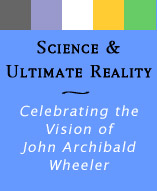The Symposium
Amazing Light: Visions for Discovery is a major project
honoring the leadership and vision of physicist and Nobel laureate CHARLES
HARD TOWNES in his 90th birthday year. The program aims to honor and amplify
his vision, taking it forward with new generations of research physicists
into the 21st century. Its goals are to explore possibilities for investigating
new, deep discoveries about the nature of reality, as well as for developing
new tools to advance this adventure. In particular, the program will focus
on the challenge of producing powerful new technologies that—- like
the laser for which Townes won the Nobel Prize - may generate opportunities
to open up whole new domains of advancement in experimental physics.
Over a career spanning almost 70 years, Charles Townes has become renowned
as a research leader, scientific advisor, and teacher of many of the 20th
century's most innovative physicists. He has combined first-rate experimental
work with development of life-changing technologies that have benefited people
everywhere in diverse ways. Also, he is known for exploring many of the most
fundamental and challenging aspects of physics in support of the quest for
a deep, comprehensive, integrated understanding of the universe. Charles Townes's
leadership beyond science has included considerable concern over ethics and
the vital challenges of expanding the powers of science and technology to
transform life for great good - and for great ill. He also has been
a notable public voice supporting serious, scholarly rigor in advancing the
quality of dialog between the different cultural and intellectual worlds of
"Science and Religion."
Amazing Light: Visions for Discovery will have two principal components:
- a high-level, major international symposium to be held October 6-8, 2005 at the University of California, Berkeley
- subsequent publication of a scholarly/scientific research volume based on further exploration of the symposium themes
The symposium will be hosted by the University of California, Berkeley. Symposium talks and the subsequent book will investigate key areas of particular interest to Professor Townes and that are linked with his accomplishments in discovering surprising new aspects of the quantum-mechanical behavior of light. Primary foci are to explore the persistence of great questions and great unknowns in physics; to emphasize the continuing potential and excitement of the field; and to consider promising and ambitious domains for future research.
Following Charles Townes's example, Amazing Light: Visions for Discovery
will emphasize the role of technological innovations that accelerate scientific
creativity and benefit human life. It will emphasize the creative edges of
the experimental (observational) aspects of physics and cosmology that may
lead to new discoveries - and especially to powerful new scientific
instruments - that may transform human capabilities to explore physical
reality. The goal of developing cutting-edge tools will be considered as a
basic creative challenge for advancing the scientific quest for a fundamental,
integrated understanding of the universe. A pre-eminent example is the fascinating
depth and richness of innovation made possible through the study of light
so successfully pioneered by Charles Townes.
The program will bring together an outstanding, select group of research
leaders within physics and cosmology. It also will seek to draw together a
group of promising young scientist-innovators emerging as the research leaders
of the future. The project incorporates an open global "Young Scholars
Competition" for investigators under the age of 40. Semifinalists will be
invited to the symposium to participate in special sessions. Substantial prizes
will be awarded to the winners for excellence in conceptualizing and presenting
fresh approaches in physics and cosmology.
Primary funding is be provided by the John
Templeton Foundation in association with other philanthropic partners.
Administration is by the Metanexus Institute.
The three major themes for the program, inspired by Professor Townes and derived from some of his ideas and questions, correspond to each day of the symposium.
Day 1
Day 2
Day 3
![]()













